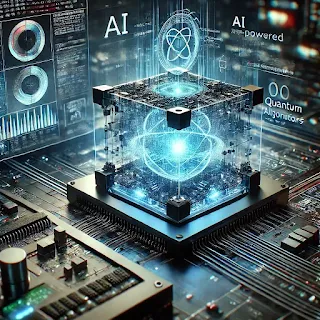The Quantum Revolution: How Quantum Computing Will Reshape the Future
Introduction
Imagine a world where computers solve problems in seconds that would take today’s most powerful supercomputers millions of years. This is the promise of Quantum Computing, a revolutionary technology set to change industries, from AI and cybersecurity to healthcare and finance. Tech giants like Google, IBM, and Microsoft are racing to develop quantum processors that will redefine computing as we know it.
But how does quantum computing work, and what makes it so powerful? Let’s dive into the future of quantum technology and how it will shape the world in ways we can barely imagine.
What Is Quantum Computing?
Quantum computing is not just an upgrade to classical computing—it’s an entirely new way of processing information. Traditional computers use bits (0s and 1s), but quantum computers use qubits, which can exist in multiple states at once. This property, known as superposition, allows quantum computers to process vast amounts of data simultaneously.
Another crucial principle is entanglement, where qubits become linked, meaning the state of one instantly influences another, no matter how far apart they are. This creates an ultra-fast and highly efficient system capable of tackling problems classical computers can’t even attempt.
How Quantum Computers Work
Unlike classical computers that perform calculations one step at a time, quantum computers explore multiple solutions simultaneously. This means they can crack encryption, optimize logistics, accelerate AI training, and simulate complex molecules for drug discovery—all at an unprecedented speed.
However, quantum technology is still in its early stages. Today’s quantum computers require ultra-cold temperatures (near absolute zero) to function, and maintaining qubit stability is a significant challenge. But with breakthroughs in quantum error correction and scalable hardware, the future of quantum computing is becoming a reality.
Game-Changing Applications
The impact of quantum computing will be transformational across multiple industries:
- Cybersecurity & Cryptography: Quantum computers could break today’s encryption, forcing the world to adopt quantum-safe security systems.
- AI & Machine Learning: Quantum-powered AI will process vast datasets exponentially faster, leading to smarter algorithms and real-time decision-making. (Image 4)
- Healthcare & Drug Discovery: Simulating molecular interactions will accelerate the discovery of new drugs and personalized medicine.
- Finance & Trading: Quantum computing will optimize stock market predictions, fraud detection, and risk assessments.
- Climate Science: Quantum simulations will enable accurate climate models, helping predict and combat global warming.
- Transportation & Logistics: Quantum algorithms will revolutionize traffic management, supply chains, and even autonomous vehicle navigation.
Challenges & Roadblocks
Despite its potential, quantum computing faces hurdles that need to be overcome before it can become mainstream:
- Hardware Constraints: Current quantum processors struggle with error rates and qubit stability.
- Expensive Development: Quantum research requires billions in investment, slowing mass adoption.
- Lack of Quantum Talent: Skilled quantum engineers and scientists are in short supply.
- Quantum Hacking Risks: Once mature, quantum computers could break traditional encryption, leading to major cybersecurity concerns.
The Future of Quantum Computing
The next decade will be a golden era for quantum breakthroughs:
- More Powerful Qubits: Future quantum chips will have increased stability, reducing errors.
- Quantum Cloud Services: IBM, Google, and Amazon are already offering cloud-based quantum computing, bringing it closer to businesses.
- Quantum-Powered AI: Combining AI with quantum computing will create hyper-intelligent systems capable of solving global challenges.
- Quantum Internet: Secure, unhackable communications based on quantum entanglement could replace traditional networks.
- Commercial Applications: By 2035, industries like healthcare, finance, and logistics could fully integrate quantum solutions.
Conclusion
Quantum computing isn’t just the future—it’s happening right now. While we’re still in the early stages, the progress being made is nothing short of revolutionary. In the coming years, quantum breakthroughs will change how we process data, secure information, and solve the world’s most complex problems.
As we step into the Quantum Age, one thing is clear: The future belongs to those who harness the power of quantum technology. The question is—are we ready for it?.












0 Comments